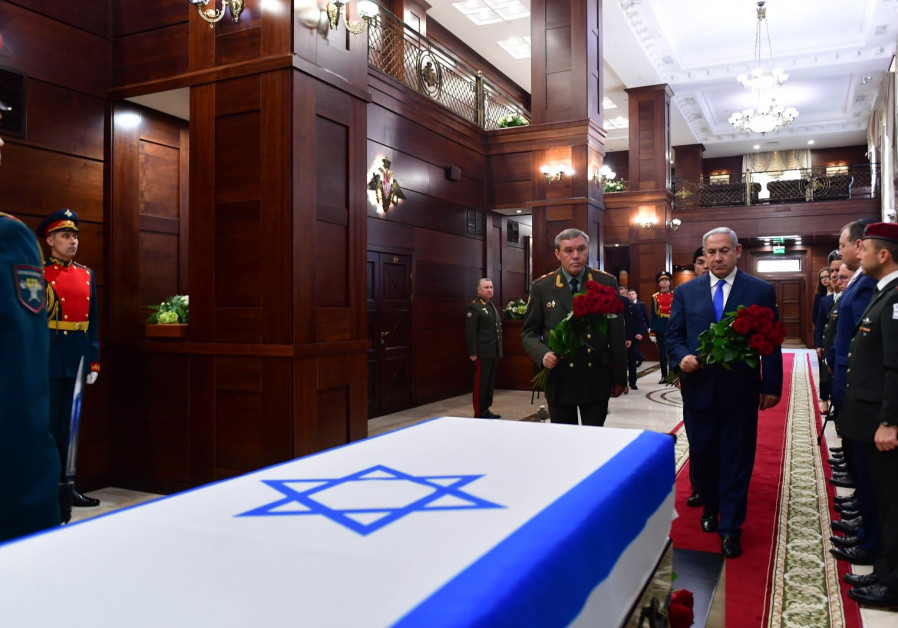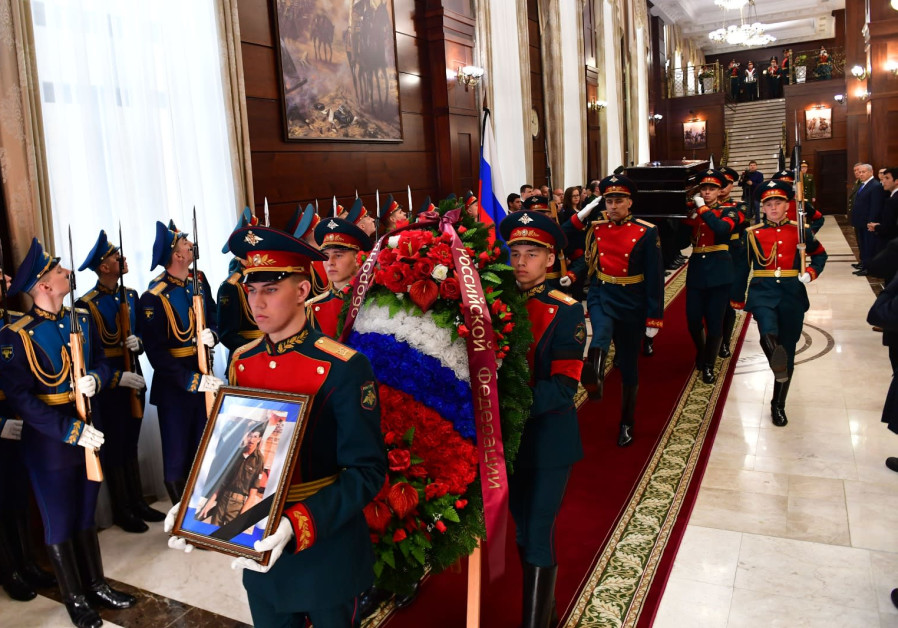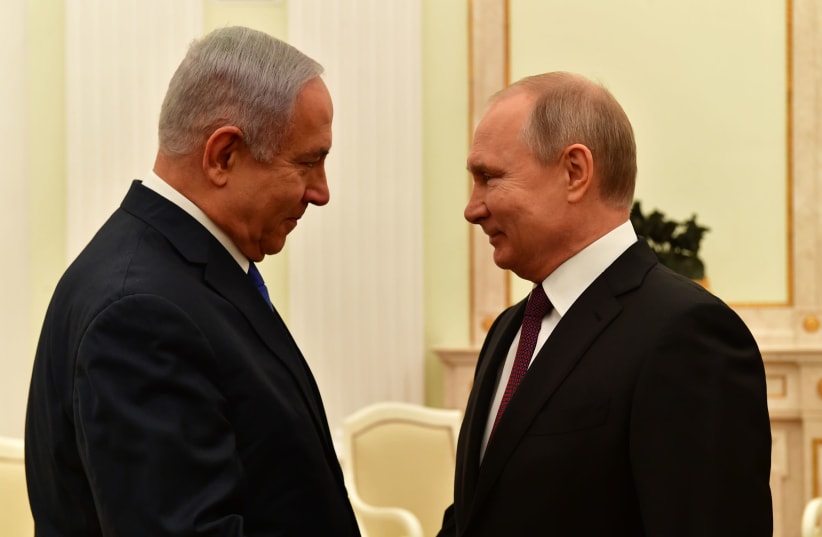Russian military forces together with their Syrian allies located the remains of IDF Sgt. Zachary Baumel, who went missing in action in the 1982 Lebanon war, the country’s president Vladimir Putin told Prime Minister Benjamin Netanyahu during a brief meeting in the Kremlin on Thursday.
“As you may know, our military personnel and their Syrian partners helped find Zachary’s remains. We are glad that he will receive proper military honors in his homeland,” Putin said, adding that “another, purely humanitarian aspect of this case is that Zachary’s family will be able to bring flowers to his grave.
“It should be mentioned that it was a difficult mission for the special operation forces group concerned. Please convey my best regards to the sergeant’s family,” Putin said.

Netanyahu had made the quick trip to the Kremlin in the aftermath of the dramatic revelation Wednesday that Israeli forensic pathologists had identified Baumel’s remains after 37 years.
The Brooklyn-born American-Israeli soldier had been listed as MIA since he was last seen in the June 1982 battle at Sultan Yacoub, in Lebanon’s Bekaa Valley during the First Lebanon War.
While the Israeli military would only say that his remains were found in Syria, Arabic-language media reported that they were found in the Yarmouk Palestinian refugee camp south of Damascus.

According to a report by Hezbollah-affiliated al-Mayadeen television in Beirut, Anwar Raja of the Popular Front for the Liberation of Palestine-General Command (PFLP-GC) – a pro-Assad-regime Palestinian militia – said the remains had been transferred to Syria following the 1982 battle, and that locating them was done in coordination with Israeli intelligence.
Militants reportedly found Baumel’s body as they were excavating graves in the old Martyrs Cemetery in the Yarmouk refugee camp earlier this month.
That sprawling refugee camp was Syria’s largest before the eight-year civil war began, housing some 160,000 Palestinians. Syrian troops regained control of the camp last May from members of Islamic State after months of heavy fighting. Several other insurgent groups had been in the camp before ISIS took control of the area south of Damascus. By the end of the street battles, the camp lay in ruins.
Baumel’s remains were transferred from Syria to Russia several days ago together with the remains of some 20 other people.
On Thursday, after his meeting with Putin, Netanyahu went to the Defense Ministry in Moscow where he was given a small, flag-draped box resembling a coffin containing Baumel’s jumpsuit and shoes. A brief ceremony was held with a Red Army honor guard.
Netanyahu brought those remains with him when he returned Thursday evening.Code-named Operation Bittersweet Song, it took two years to complete the negotiations, which were only made possible by Israel’s close cooperation with Russia. According to a report by Yediot Aharonot, former defense minister Avigdor Liberman had pushed for the operation to take place. The operation was reportedly frozen in September following the downing of a Russian military aircraft during an Israeli operation in the skies above Latakia, Syria.
That same month, Russia claimed that its military worked with Israel on an operation to locate the remains of the fallen IDF soldiers that were in newly-captured Syrian territory formerly under the control of ISIS.
“Israel appealed to Russia with a request for help finding the remains of Israeli servicemen located at specific coordinates in Syria. The search was organized after Russia agreed to the operation with our Syrian partners,” said Russian Defense Ministry spokesman Maj.-Gen. Igor Konashenkov.
A diplomatic source said on Thursday that in publishing information about Baumel on Wednesday, Netanyahu had initially been silent about Russia’s involvement at Moscow’s request, and out of fear that it would compromise the search for other MIAs, including Sgt. Tzvi Feldman and Sgt. Yehudah Katz, who are also listed as missing in that same battle.
Putin, however, made the information public at the start of his meeting with Netanyahu. In addition, Moscow organized a ceremony at the Defense Ministry in honor of Baumel, together with the Chief of the General Staff of Russia’s Armed Forces Valery Gerasimov.
The diplomatic source noted that it was significant that Russia had acted on a request from Israel in this matter, and that it had not insisted on a quid pro quo.
Baumel was killed during the battle of Sultan Yacoub, between the IDF and the Syrian army, which took place in June 1982, on the sixth day of the First Lebanon War in the Bekaa Valley.
At the end of the battle, 20 IDF soldiers had been killed and more than 30 had been wounded. Six soldiers were MIA including Katz, a gunner in one tank crew, and Baumel and Feldman in a second tank. Two other soldiers who went missing after the battle, Ariel Lieberman and Hezi Shai, were returned to Israel alive in 1985. The remains of Zohar Lipschitz were returned in 1986.
IN HIS public comments at the Kremlin, Netanyahu recalled for Putin that, “Two years ago I turned to you with a personal request – that you help us in finding the remains of the soldiers, including Zachary Baumel, out of the great shared values of comrades-in-arms and fellowship of soldiers. You responded immediately.
“You said that you would act personally. You called on your people, who did exceptional work, and several days ago, you brought us the late Zachary Baumel to Israel, and he will be buried in Jerusalem this evening,” Netanyahu said.
“I am always happy to visit here with you, Mr. President, but today is especially moving. You have just now expressed the supreme value that you and the Russian people ascribe to finding the missing, and bringing [fallen] soldiers to burial. This is our common value,” Netanyahu said.
He also thanked the Russian president for the “brave friendship” between them and their countries.
Netanyahu also recalled for Putin his emotional exchange with the Baumel family the night before, after they heard the news.
“They [the Baumel family] were moved in a way that I cannot describe to you, Mr. President. They were so moved, first of all by the return of their son and brother. The father has already passed on. The mother will be 90 soon; it was very emotional,” Netanyahu said.
Baumel’s sister, brother “and their children came to see me – and as I told them of your decision and about the fact that Russian soldiers took actions, sometimes at personal risk, they were open-mouthed and asked me to convey their deepest gratitude, which is shared by all Israelis,” Netanyahu said.
In his remarks, Putting explained to Netanyahu that his country takes the issue of MIAs very seriously.
The Russian army, which was still in the process of identifying the remains of its fallen from World War II, understands the significance of allowing families to have closure on this issue, Putin said.
Netanyahu traveled to Moscow with a security delegation that included the heads of the Mossad, Military Intelligence and the National Security Council.
Aside from recognizing Russia’s role in the return of Baumel’s remains, the Israeli and Russian delegations also spoke about the situation in Syria today.
Both armies have a deconfliction mechanism by which they coordinate military activity in Syria, where Russia has troops stationed and where Israel conducts aerial strikes against military targets belonging to Iran and its proxies such as Hezbollah.
Tensions erupted last year between Russia and Israel after Moscow blamed Israel of indirectly causing the downing of a Russian intelligence aircraft by Syrian air defenses following a nearby IAF airstrike.
Israel, in turn, has been upset by the Russian sale of the advanced S-300 missile system to Syria.
According to Yediot Aharonot, Russia asked Israel to increase the warning time it gives its army before conducting a strike in Syria.
